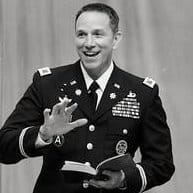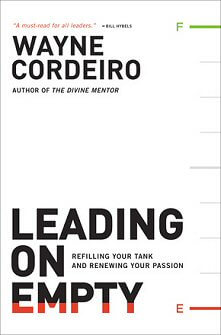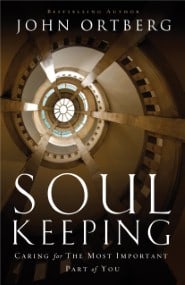
Last week, Kip shared “The Driven Leader, Part 1.” Here, he continues his thoughts on “driven-ness,” passion, and leadership:
Jesus was a man of passion.
When you look at Jesus’ earthly ministry, you find that Jesus often withdrew to a quiet place, walking away from ministry opportunities, people to be healed and miracles to be accomplished (work) so that He could stay in relationship with the Father. Jesus had an uncanny rhythm with his Heavenly Father. He ebbed and flowed with the Almighty as God directed him (John 5:19).
Jesus had passion, but his passion had boundaries. He frequently retreated to be in solitude with the Father. He didn’t heal everyone he came into contact with. He didn’t befriend everyone. He poured himself into a few individuals.
That’s a great lesson for us, whether we are in ministry or working in the secular world.
Remember, in 1 Corinthians 9:24, Paul tells us that life’s race is not a sprint but a marathon.
A marathoner needs the self-discipline not only to train with fervor and emphasis but to know when and how to surge, ebb, and flow in the training and the race. By “running in such a way to get the prize,” Paul encourages us to be people of passion rather than driven demoniacs.
I wish I could say I learned a valuable lesson from that really bad day in Seoul.
Unfortunately, it took me nearly a decade to work through this thing called driven-ness to become a leader with a healthy passion for my calling. It would take another really bad day for me to finally seek the help I needed to deal with unhealthy driven-ness and take steps to become a passionate leader with godly boundaries.
I had to reach the point where I could recognize the need for what I call, “soul space.” That place where you create daily room for cream in your cup so that it doesn’t spill onto your lap. That place where you find a rhythm with God that resembles the rhythm Jesus had with his Heavenly Father.
I currently pastor a satellite campus of our main church. That campus is located 30 miles south of my home in Ferndale, Washington. Pastoring a satellite church in close proximity (30 miles) to the parent church essentially means that I’m pastoring in two churches full time.
Don’t get me wrong—I love my church. God is moving through our church in so many ways there’s not enough ink in my printer cartridge to spew out the stories of how Christ is in action in my small world. Still, the requirements of ministry sometimes take their toll on me and my family because I consistently fail to place boundaries on this passion I have for my God-given calling as a pastor.
Recently, driving to work before my weekly small group meeting, I was exhausted. My driven-ness had caught up with me, just like it had in Seoul seven years earlier. Instead of a presidential visit, this time it was a family matter that caused me to snap.
I simply confessed to God that I was a tragedy away from losing my joy and a Sunday away from walking away from my calling. Not a good place to be when you’re a pastor.
I struggled through the day and tried to spend time in God’s word, but I couldn’t concentrate. I pounded more caffeine to stay focused, prep a sermon, and then meet with several people before assisting with our annual church-wide barbeque and baptisms. I left work early that day, sat down with my wife, Linda, and laid out my concerns in my life . . . which means I “word vomited” in her lap. I told her, “I’m a tragedy away from losing my joy and a Sunday away from walking away from my calling.”
She didn’t even blink.
You have to understand my wife is used to being what I call a “vomit recipient.” She has put up with my driven-ness throughout my military career. Over the years I would come home from work or a deployment exhausted and she’d do what she has always done so well. She’d simply listen as I’d vomit the day’s events on her lap. It’s been no different in the past several years in civilian ministry. My wife knows when to simply listen and when to interject.
On that day, she interjected.
Linda helped me see that my driven-ness was out of sorts. She showed me places where my passion lacked boundaries. I was meeting with too many people and neglecting gifting God had given me in other areas, like writing and preaching. She pointed out unhealthy areas where I was trying to be a fixer in everyone’s life instead of pointing them to the One who gives us life.
In other words, I was trying to be everyone’s Jesus. I needed to pull back from those consistent, habitual meetings and get control over what God had given me to control—my schedule. I needed to establish healthy boundaries so that I could get my passion for life back and live out my calling in a healthy manner.
And here’s the truth I learned that day in a 15-minute conversation with my wife: When you’re trying to be everything to everyone you’ll be significant to no one.
That conversation showed me that my driven-ness had broken down any semblance of boundaries in my life. I was trying to be significant to everyone, to lean into pain and terrain, to get the job done, and in the end I was ready to crash. What’s more is everyone, especially those closest to me, was suffering.
Have you ever been so focused on helping the needy that you neglect your own needs?
Driven-ness without boundaries leads to burnout, a loss of joy, and eventually, walking away from God’s calling. Too many things can invade your “soul space”—that place where God longs to meet with you multiple times throughout your day. That place that must be protected by healthy boundaries.
It doesn’t matter if you’re a pastor or a plumber. When you spread yourself too thin, those closest to you pay the price. You limit your effectiveness as a Christ follower in your corner of the world. Your intentions may be great—you’re doing all you can to help others and lead well. But at some point those intentions can lead to unhealthy activity that pulls you away from your faith and those you love dearly. You become ineffective at bringing God’s kingdom to reality right here, right now.
In the book of Hosea God gives us a lesson on priorities. Through the prophet Hosea, God points out that Israel’s alliances for protection and prosperity were ill-placed. He shows the Jewish nation that only he could provide both of those things. In the Hosea account, Israel (“Ephraim”) had allied itself with countries that had two bad character traits—heathenism and uselessness. That latter point of uselessness was emphasized when Hosea referred to Ephraim as a loaf of bread that’s burned on one side and doughy on the other (Hosea 7:8). In other words, Israel had become useless, like the countries with which it has allied itself, because it failed to prioritize in a godly manner.
And that’s what happens to us when we fail to create healthy boundaries for our passions. Our priorities become misaligned and we become that useless, half-baked dough. When that happens, we hit the wall. The result: we lose our ability to be that salt and light Jesus calls each of us to be as leaders.
The good news for us is that, unlike Ephraim, we’re never thrown out and discarded like a bad loaf of bread. God gave us his Son, Jesus, as the perfect sacrifice so we would have abundant and eternal life through Him. Jesus didn’t give his life for useless things. He gave his life and his love for things of worth and use—you and me. But as leaders we must take care of ourselves. We have important work God has called us to do.
So what are some ways you and I can avoid burnout?
First, we need to understand that we’re not responsible for everything in our lives. It is Jesus who saves, not you or me, so we can take that responsibility off of our daily to do list and give it to him—the only one who can bear that responsibility.
Instead of “fixing” our kids when they make bad decisions, we can pray for them and point them to Jesus.
Instead of taking on the responsibility of pulling a loved one out of an addiction, we can rest in the task of simply loving them and pointing them to Christ.
Instead of worrying about a friend’s issues as if they were our own, we can give that person and his or her issue to Jesus, who has the power to change others.
Next, we can take time to study and meditate on places in God’s Word where he desires to fill our souls with life and energy. The Psalms are a great place to start. Spending multiple times with God each day through prayer and scripture reading allows the Holy Spirit to heal, comfort, and restore.
Lastly, God has blessed us with gifted and passionate writers and leaders who have gone through this thing called burnout. Wayne Cordeiro’s Leading on Empty, John Ortberg’s Soul Keeping, and Henry Cloud and John Townsend’s Boundaries: When to Say Yes and How to Say No to Take Control of Your Life are good starting points for the leader suffering from driven-ness, and they provide insightful and valuable ideas for setting up healthy boundaries as we walk in our calling as leaders. You may be at the point I found myself on those two fateful days and need to seek Christian counseling to help you recover. There’s hope and healing in Christ through a multitude of resources. Don’t wait until it’s too late to deal with driven-ness.
Before that conversation with my wife, I was that driven man who tried to be everything to everyone, which made me significant to no one. After that conversation and some counseling with a godly, Christian counselor, I realized that more than three decades of driven-ness was going to take me out of the race Christ called me to run. I was able to make some much needed yet fairly simple life changes, which included relentless boundaries and radical soul care. I’m now starting to become a passionate man who, at the end of the day, knows that God is doing something and that he and I are doing it together, with God in the lead.
It’s going to take a long time to totally recover, but I’m okay with that because life is a marathon, not a sprint.
Peace is not a hopeless dream for your life. You can live a life of meaning, purpose and passion if you live out your calling in relationship with Jesus through the Holy Spirit. Run the race well. It’s a long one.
* * *
For more spiritual insight into battling burnout, stress, and leadership, check out Kip’s recommended reading:
If you missed “The Driven Leader, Part 1,” check it out.








